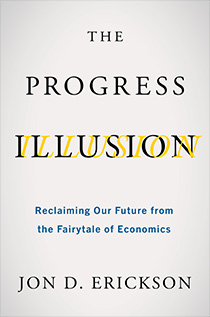"Erickson’s cri de coeur is bracing and coherent. Progressives should take heed."
Publishers Weekly
"I strongly recommend The Progress Illusion for upper level undergraduates and graduate students studying economics and for professors who teach economics. This highly readable book provides a refreshing alternative to the dominant value-free, market-oriented, and growth-obsessed neoclassical theory. In particular, the book is ideal for a course in ecological economics or sustainability. The passages on climate change underscore the need for combining natural science with social science for greater resilience and for the transition to renewable energy, which is necessary to save the planet."
Sustainability and Climate Change
"Erickson has written a book for those who went through graduate programs in economics and came out doubting the neoclassical assumptions of the discipline and believing that market failure was not the exception but the norm and those who ever wondered how economics went so far astray of its role as a social science and concentrated instead on reducing humanity to perfectly rational, mathematically tractable agents….This highly engaging book is well worth the read for anyone who is ready to stop thinking about themselves as Homo economicus."
Choice
"[The Progress Illusion] underlines the importance on non-monetary aspects of life and shows the dangers of putting a monetary price on everything, from human life to the value of planet Earth. Material progress should not be the only (and maybe not even the main) goal of man. As an economist trained in heterodox economics, I fully understand the author’s frustration with the shortcomings of mainstream economics."
Journal of Philosophical Economics
"Erickson's powerful new book shows how flawed economic thinking has shaped not only our economy but also our society and politics. The story is both deeply disturbing and hopeful, as Erickson describes an emerging brand of economics that shifts focus from GDP to well-being. Highly recommended."
James Gustave Speth, former Dean, Yale School of the Environment; author of "America the Possible: Manifesto for a New Economy"
"Interweaving the history of economic thought with stories of his personal scholarly journey, Jon Erickson walks us through the old ways of economic thinking that led us here and reveals a potential path forward. This book is a must-read for anyone who cares about our collective future, and the intellectual tools we need to build a brighter one."
Laura Schmidt Olabisi, Associate Professor, Department of Community and Sustainability, Michigan State University; President, United States Society for Ecological Economics
"A searing, authoritative, and well-documented indictment of an economics that advocates economic growth as the solution for every problem created by economic growth. If you know a young person contemplating a career in economics, you owe it to them to save their soul by giving them a copy of this book."
David Korten, author of "When Corporations Rule the World" and "Change the Story, Change the Future: A Living Economy for a Living Earth"
"Given that the Arctic has mostly melted, it seems axiomatic that our planet’s economic system is not working very well. But Jon Erickson explains – in simple and powerful terms – just why that is, and just what would need to change if we were to actually build a world that worked much better. It’s a real gift to all of us!"
Bill McKibben, author of "The Flag, the Cross, and the Station Wagon"
"In accessible language filled with stories, ecological economist Jon Erickson shows how growth-driven economies, worsening inequities, and greenhouse gas emissions are interconnected, and thus it is possible to envision alternate paths forward which address all three."
Patricia (Ellie) Perkins, Professor, Faculty of Environmental and Urban Change, York University and editor of The Routledge Handbook of Feminist Economics
"This book is a must-read for those who wish to understand how a promising discipline strayed inexorably from a more humane path to one that extols unbridled materialism, inequity, and environmental destruction. Economics can be rescued from its self-destructive path by having more courageous, assertive, and iconoclastic scholars like Erickson."
Steve Onyeiwu, Andrew Wells Robertson Professor of Economics, Allegheny College and author of "Emerging Issues in Contemporary African Economies"

